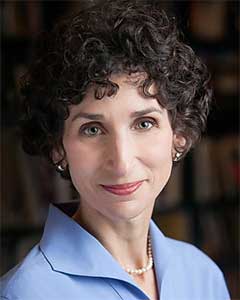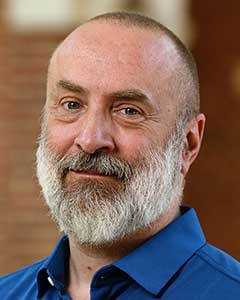PERLHS Academy Faculty
Core Leadership
Jodi Segal, M.D., M.P.H.
Jodi Segal is a professor of medicine at the Johns Hopkins University School of Medicine. She has joint health policy, management, and epidemiology appointments at the Johns Hopkins Bloomberg School of Public Health. Dr. Segal is internationally recognized as a comparative effectiveness researcher and pharmacoepidemiologist. She serves as the associate director of the Center for Health Services and Outcomes Research (CHSOR) and the co-director of the Center for Drug Safety and Effectiveness (CDSE), both in the School of Public Health. Her research interests center on reducing low value healthcare in older adults. She practices as a general internist.

Jill Marsteller, Ph.D., M.P.P.
Jill Marsteller has been involved in health services research since 1993 and specializes in organizational behavior and theory, specifically in estimating the influence of organizational variables and contextual measures on quality improvement activities in learning organizations. She focuses her research on the determinants of successful implementation, dissemination, and sustainability of knowledge. She conducts mixed methods research in both inpatient and ambulatory health care settings.
She is jointly appointed in the Johns Hopkins School of Medicine's Department of Anesthesia and Critical Care Medicine in the Armstrong Institute for Patient Safety and Quality, where she leads the Research Facilitation Council, and at the Johns Hopkins Carey Business School. She also serves as an Associate Director of the Center for Health Service and Outcomes Research and as the co-leader of the Behavioral, Social and Systems Science Translational Research Community within the Institute for Clinical and Translational Research. uses organization and implementation science to evaluate and promote positive provider interactions, equity, quality and safety in care delivery. Her research interests include teamwork, organizational behavior, organizational theory, quality improvement, patient safety, disparities, implementation science, and organizational learning.

Harold Lehmann, M.D., Ph.D.
Harold Lehmann is a professor of biomedical informatics and data science (Department of Medicine) at the Johns Hopkins University School of Medicine. He holds joint appointments in Pediatrics and Health Policy and Management and in International Health at the Johns Hopkins Bloomberg School of Public Health. His areas of clinical expertise include general pediatrics, although he is no longer clinically active. Dr. Lehmann serves as the informatics lead for the PaTH/PCORnet site of Johns Hopkins.
Dr. Lehmann's research interests include real-world evidence, evidence-based medicine and decision-making, decision analysis and Bayesian and computable scientific communication. Dr. Lehmann is a fellow of the American College of Medical Informatics, and Associate Editor of JAMIA. He is a member of the Society for Medical Decision-Making and the American Medical Informatics Association.

Theodore "Jack" Iwashyna, M.D., Ph.D.
Theodore "Jack" Iwashyna is a critical care physician and health services researcher whose research seeks to understand the context of critical illness, both how critical illness influences a patient’s life course, and how the organizational environment influences the effectiveness of the care that a patient receives. He aims to improve long-term health outcomes and quality of life for survivors of critical illness through social and health safety net integration.
Dr. Iwashyna’s innovative research has provided evidence of the long-term impact of severe acute infections in the United States, showing that patients who survive sepsis often have enduring cognitive and functional deficits that last for years and result in difficulties completing basic activities in daily living and that survivors are at higher risk for re-admission to the hospital and death. Iwashyna has worked with an international coalition to reframe advice on inpatient treatment of sepsis to incorporate explicit discussions of supporting family members and including neighborhood context and financial resources as key components in recovery. He currently is working on identifying modifiable social and contextual factors that shape functional recovery after a serious illness and investigating the roles of employment, financial toxicity, and caregiver burden as both outcomes of and contributors to recovery.

Matthew Robinson, M.D.
Matthew Robinson is an assistant professor in the Division of Infectious Diseases at Johns Hopkins University School of Medicine. He is interested in leveraging diagnostic innovation and precision medicine to reduce diagnostic and prognostic uncertainty for infectious diseases. His current projects include applications in global health, antimicrobial resistance, antibiotic stewardship, infection control, COVID-19, acute febrile illness, and tuberculosis. Since joining the faculty in 2019, Dr. Robinson has been supported by the Centers for Disease Control and Prevention, the National Institutes of Health, and the Food and Drug Administration. The focus of his work in antimicrobial resistance, antibiotic stewardship and infection control has been to characterize drug-resistant Gram-negative infections in India. His work with the Johns Hopkins Precision Medicine Center of Excellence for COVID-19 has included applying machine learning and causal inference techniques to predict COVID-19 outcomes. He has contributed to SARS-CoV-2 diagnostic development through the NIH Rapid Acceleration of Diagnostics (RADx) initiative and the collaborative development of other novel diagnostics.

Mentors
-
Stephanie Morain is an assistant professor at the Department of Health Policy and Management, Berman Institute of Bioethics. She is an expert on the bioethics of human subjects research. She conducts both empirical and normative research into issues at the intersection of ethics, law, and health policy. Dr. Morain’s work examines political and ethical issues concerning the scope of government authority in public health and the role of stakeholder opinion in shaping decision-making in public health policy. Specific research interests include the ethics and politics of disease control and injury prevention; public health law; and ethical and policy challenges presented by the transition to learning healthcare systems.
-
Christopher Chute is a Bloomberg Distinguished Professor of Health Informatics, Section Head of Biomedical Informatics and Data Science (BIDS), Deputy Director, Institute for Clinical and Translational Research, Co-Chair, Research Subcouncil of Johns Hopkins Data Trust, and a Professor of Medicine. His career has focused on how we can represent clinical information to support analyses and inferencing, including comparative effectiveness analyses, decision support, best evidence discovery, and translational research. He has had a deep interest in semantic consistency, harmonized information models, and ontology. His current research focuses on translating basic science information to clinical practice, and how we classify dysfunctional phenotypes (disease).
-
Ayse Gurses is the director of the Armstrong Institute for Health Care Human Factors and a professor of anesthesiology and critical care medicine. Her current research focuses on improving patient safety in the cardiac operating room, transitions of care/handoffs, care coordination, compliance of providers with evidence-based guidelines and nursing working conditions. Dr. Gurses also collaborates on research related to the development of geriatric health service delivery at all levels of the health system, from the patient and providers to the hospital and health system. She has extensive experience with working in interdisciplinary research environments and collaborating with clinicians on human-factors-related projects.
-
Michael Rosen is an associate professor of anesthesiology and critical care medicine. He is a human factors psychologist with research interests in the areas of teamwork and patient safety as well as simulation-based training, performance measurement, naturalistic decision-making, and quality and safety improvement. His current research focuses on the development, validation and application of behavioral markers of team performance in a variety of clinical domains, team feedback strategies and the development of methods for using in situ simulation and diagnostic classification models to understand unit safety needs.
-
Hadi Kharrazi is a co-director of the Center for Population Health IT (CPHIT), Johns Hopkins Bloomberg School of Public Health, co-director of the PhD Health Sciences Informatics program at Johns Hopkins School of Medicine and the director of the DrPH Health Informatics program at Johns Hopkins Bloomberg School of Public Health. Dr. Kharrazi studies the role of data science, informatics, and predictive models in managing healthcare utilization while improving health outcomes. His research interests include population health informatics, risk stratification, predictive modeling, social determinants of health, and clinical informatics.
-
Ravi Varadhan is a professor of oncology in the Quantitative Sciences Division at the Sidney Kimmel Comprehensive Cancer Center at Johns Hopkins. He is also a core faculty member in the Center on Aging and Health and the Center for Drug Safety and Effectiveness.. Dr. Varadhan is a biostatistician and is an expert in the area of patient-centered outcomes research (PCOR), where he focuses on developing statistical methods that inform evidence-based individualized medicine. His research interests include statistical methods for the analysis of heterogeneous treatment effects, modeling approaches for studying the etiology of geriatric frailty, computational algorithms/software for convergence acceleration and physical resilience to stressors.
-
Somnath Saha is a professor of medicine, Division of General Internal Medicine, and director of TL1 Clinical Research Program at the Institute for Clinical and Translational Research. Dr. Saha was involved in working on the VA Queri embedded researcher curriculum when he was a VA faculty member. Dr. Saha’s work focuses on the influence of race and ethnicity in the doctor-patient relationship, its relation to racial disparities in the quality of health care, and its implications for diversity in the healthcare workforce. His research interests include health equity, racial disparities in health care, workforce diversity, patient-clinician relationships, and social determinants of health.
-
Conan Dickson is the associate director of the MHA Program and associate scientist, Department of Health Policy and Management. Dr. Dickson served as the director of the Johns Hopkins Administrative Fellowship for 15 years, during which he gained extensive experience serving as a mentor. He leverages his experience in health system management to enhance education in health care strategy, finance, and quantitative tools.
-
Albert Wu is the director of the Center for Health Services and Outcomes Research, director of Strategic Collaborations, Johns Hopkins Armstrong Institute for Patient Safety and Quality, and the Fred and Julie Soper Professor of Health Policy and Management. He studies the impact of safety problems on patients and healthcare workers. His research interests include patient safety, second victim, disclosure, incident reporting, quality of life, comparative effectiveness research, patient-centered outcomes research, quality of care, MOS-HIV health survey, community-based participatory research, and peer support.
-
Maura McGuire is the assistant dean for Part-Time Faculty, director of the Longitudinal Clerkship, the senior director of Education and Training for Johns Hopkins Community Physicians, and an associate professor of medicine. Dr. McGuire’s research focuses on the use of education to improve the safety and quality of primary care, with a special focus on the impact of electronic medical records and care delivery optimization. She also evaluates the use of assessment and technology to enhance learning in health care professionals and primary care physicians.
-
Yvonne Commodore-Mensah is an associate professor at Johns Hopkins School of Nursing. Her current program of research seeks to reduce the burden of cardiovascular disease risk among Africans locally (United States) and globally (sub-Saharan Africa) through community-engaged research. Dr. Commodore-Mensah is an expert in the use of large datasets as well as in the conduct of clinical trials, particularly regarding cardiovascular outcomes. Her research areas include immigrant health, global health, cardiovascular disease epidemiology, and social determinants of health.
-
David Newman-Toker is the director of the Armstrong Institute Center for Diagnostic Excellence, and a professor of neurology, ophthalmology and otolaryngology. He is a long-time mentor in the Graduate Training Program in Clinical Investigation. His clinical expertise is in disorders of the brainstem and cranial nerves, including visual loss, double vision, and vertigo. Dr. Newman-Toker's academic mission is to eliminate harms from diagnostic errors and maximize the accuracy and efficiency of diagnostic testing in clinical practice. His research interests include recognition and prevention of diagnostic errors in frontline healthcare settings, stroke misdiagnosis in the emergency department, dizziness and vertigo, eye movement analysis, informatics tools and devices at the point of care, and diagnostic decision support.
-
Matt Austin is an associate professor of Anesthesiology and Critical Care Medicine and director of the Armstrong Institute Center for Meaningful Measures. He has deep knowledge of health system quality measurements and his research focuses on performance measurement in health care. His research interests include quality improvement and patient safety performance measurement, transparency of quality data driving improvements in care delivery, measuring disparities in the quality of care, and measuring diagnostic performance of hospitals.
-
Kathy McDonald is a Bloomberg Distinguished Professor of Health Systems, Quality, and Safety, co-director of the Center for Diagnostic Excellence, professor of medicine, Division of General Internal Medicine, Malone Center for Engineering in Healthcare, Armstrong Institute for Patient Safety and Quality and participates in the Hopkins Business of Health Initiative. She explores what makes for safe, affordable, and high-quality healthcare delivery systems and the factors that prevent health organizations from achieving that standard of care.
-
Emmanuel Drabo is an assistant professor of Health Policy and Management, Center for Health Services and Outcomes Research, Roger C. Lipitz Center for Integrated Health Care. He is a health economist with particular expertise in cost-effectiveness modeling and econometrics. His research interests include health economics, economic evaluation, decision analysis, modeling, econometrics, HIV/AIDS, infectious diseases, chronic conditions, Alzheimer’s disease and related dementias, aging, health disparities, and safety-net programs.
-
Paul Nagy is the deputy director of the Johns Hopkins Medicine Technology Innovation Center an associate professor of Radiology and Radiological Science. He has played a leading role in the transformation of our electronic health record data to the OMOP common data model. His research focus is developing biomarkers from medical imaging to enable real-world reproducible evidence from observational research.
-
Akiho Nishimura is an assistant professor of Biostatistics of the Johns Hopkins Bloomberg School of Public Health. He has been involved in many analytically complex projects with colleagues and trainees using the electronic health record data from our health system. Dr. Nishimura uses Bayesian methods and statistical computing to tackle methodological challenges in healthcare analytics and large-scale biomedical applications.
-
Scott Zeger is a co-director of the Hopkins inHealth Program and a John C. Malone Professor of Biostatistics and Medicine. He is an expert methodologist and co-directs a university-wide collaboration to use medical data more intelligently to improve health outcomes and lower costs. His research interests include biostatistics, environmental statistics, epidemiologic statistics, Bayesian statistics, hierarchical models, longitudinal data analysis, regression analysis, time series analysis, and international health.
-
Yea-Jen Hsu is an associate scientist at the Johns Hopkins Bloomberg School of Public Health. She is an implementation scientist with expert analytic skills. Her research interests include program evaluation, care quality & patient safety improvement, implementation science, and innovative care delivery model.
-
Eliana M. Perrin is a Bloomberg Distinguished Professor within the Johns Hopkins Schools of Medicine and Nursing. Dr. Perrin has developed, tested, and disseminated many tools to help pediatricians prevent and treat obesity. Her research focuses on what pediatricians can do during well-child checks to support parents in helping children grow up healthy, and her groundbreaking work has had a broad impact on an epidemic that affects 1 in 3 children in the United States. Dr. Perrin has spanned qualitative and quantitative methods and topics—from inflammatory markers in neonates to developing and testing color-coded growth charts to the influence of messages in children’s movies—to understand the many facets of childhood obesity and health correlates, particularly focusing on disadvantaged communities. She has extensive mentoring experience in health services research, clinical investigation best practices, the study of primary care delivery and outcomes, and population’s health.
